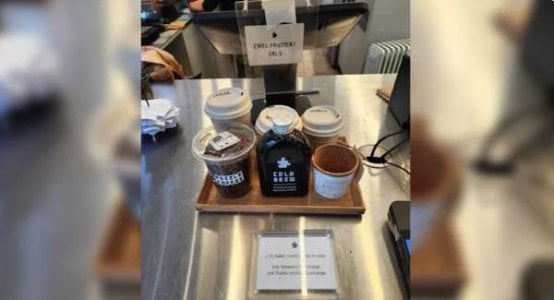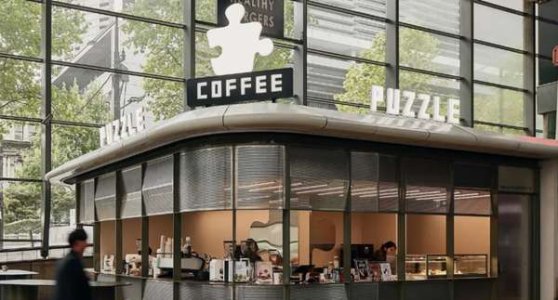This Aussie cafe is under fire for a ‘scam’ at their counter
Gone are the leisurely days of strolling to the neighbourhood cafe, clutching a five-dollar note in our well-worn wallets, fantasising about the aromatic freshly brewed coffee that awaited us.
The present reality necessitates our ability to learn, comprehend, and adjust to new modes of transactions.
Whether it's scanning QR codes or making card payments, these are the modern requirements for indulging in that same cup of coffee.
Let's take a moment to explore the reasons behind our nation's rapid shift towards cashless transactions.
In Australia, card transactions have seen a significant surge in recent years, and it's not difficult to see the advantages: convenience, speed, and the relief of carrying lighter wallets.
However, before we all eagerly embrace the wave of digitisation, it's crucial to be aware of the potential pitfalls that come along with it.

A recent incident involving a coffee-loving customer sheds light on the potential drawbacks of the digital shift. Puzzle Coffee, a seemingly innocent establishment within Melbourne's bustling Southern Cross Station, has garnered attention for the wrong reasons.
The customer noticed two peculiar signs displayed at the shop's register. The first sign proudly declared their cashless policy, stating that only card payments were accepted.
While businesses have the right to choose their preferred payment method, it was the second sign that raised concerns. This sign indicated that every card transaction would incur a 1.2 per cent surcharge.
Here's an important point to remember: According to the Australian Competition & Consumer Commission (ACCC), businesses can impose a surcharge only if there is an alternative payment method available to customers without any additional charges.
‘If there's no way for a consumer to pay without paying a surcharge, the business must include the minimum surcharge payable in the displayed price for its products.’ the Australian Competition & Consumer Commission (ACCC) states.

After the revelation was made public, a representative from Puzzle Coffee confirmed that the cafe was made aware of the problem and apologised to their customers.
They stated, 'We were just informed by a customer yesterday and we have since removed the surcharges. We apologise to any customers affected and will be actively providing refunds.'

Despite the apology, the incident leaves us with a lingering aftertaste. So, our dear members, here are some practical tips for preventing such incidents:
Have you encountered any instances where businesses implemented cashless payment policies but failed to disclose additional surcharges? How important is it for businesses to clearly display any extra charges associated with card transactions?
The present reality necessitates our ability to learn, comprehend, and adjust to new modes of transactions.
Whether it's scanning QR codes or making card payments, these are the modern requirements for indulging in that same cup of coffee.
Let's take a moment to explore the reasons behind our nation's rapid shift towards cashless transactions.
In Australia, card transactions have seen a significant surge in recent years, and it's not difficult to see the advantages: convenience, speed, and the relief of carrying lighter wallets.
However, before we all eagerly embrace the wave of digitisation, it's crucial to be aware of the potential pitfalls that come along with it.

Puzzle Coffee, the café in Melbourne, has faced allegations of scamming customers by exclusively accepting card payments that involve a surcharge. Source: Reddit/ OopsieShouTaoDoopsie.
A recent incident involving a coffee-loving customer sheds light on the potential drawbacks of the digital shift. Puzzle Coffee, a seemingly innocent establishment within Melbourne's bustling Southern Cross Station, has garnered attention for the wrong reasons.
The customer noticed two peculiar signs displayed at the shop's register. The first sign proudly declared their cashless policy, stating that only card payments were accepted.
While businesses have the right to choose their preferred payment method, it was the second sign that raised concerns. This sign indicated that every card transaction would incur a 1.2 per cent surcharge.
Here's an important point to remember: According to the Australian Competition & Consumer Commission (ACCC), businesses can impose a surcharge only if there is an alternative payment method available to customers without any additional charges.
‘If there's no way for a consumer to pay without paying a surcharge, the business must include the minimum surcharge payable in the displayed price for its products.’ the Australian Competition & Consumer Commission (ACCC) states.

A customer was purchasing a coffee from Puzzle Coffee, located in Southern Cross Station in Melbourne. Source: Instagram/ThePuzzleCoffee
After the revelation was made public, a representative from Puzzle Coffee confirmed that the cafe was made aware of the problem and apologised to their customers.
They stated, 'We were just informed by a customer yesterday and we have since removed the surcharges. We apologise to any customers affected and will be actively providing refunds.'
Key Takeaways
- A Melbourne café, Puzzle Coffee, is accused of 'blatant scamming' by a customer due to its mandatory card payment and subsequent surcharge policy.
- The customer highlighted that the café charges a 1.2 per cent surcharge on card payments yet does not display this surcharge in the price of goods, as is required by law under ACCC regulations.
- The café was made aware of the issue and has since removed the surcharges, apologising for the mistake and offering refunds to affected customers.
- The café confirmed it went cashless during the COVID-19 pandemic to protect staff and reduce theft by keeping no cash on the premises.
Despite the apology, the incident leaves us with a lingering aftertaste. So, our dear members, here are some practical tips for preventing such incidents:
- Carefully check the displayed price and ask about any additional charges before paying.
- Know your rights. If you spot something fishy, don't shy away from querying it.
- Keep your receipts. It may sound old-fashioned, but receipts are your best bet when seeking refunds.
Have you encountered any instances where businesses implemented cashless payment policies but failed to disclose additional surcharges? How important is it for businesses to clearly display any extra charges associated with card transactions?







